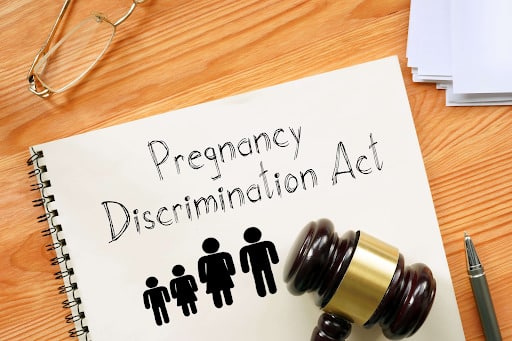In the United States, about half of the workforce consists of women, and 85% of working women become mothers during their careers. However, many women face employment discrimination during their pregnancies – from being denied certain benefits or accommodations to being fired. Whether they are pregnant and denied special accommodation to keep working or have pregnancy-related conditions that make them unable to work, there are many types of pregnancy discrimination cases.
An experienced employment law attorney will be not only able to fight for your rights, but will also provide valuable insight into how you may best proceed with your legal strategy and case.

What Is Pregnancy Discrimination?
Pregnancy discrimination involves treating a woman differently because she is pregnant. This could include denying her perks or privileges that would usually be offered to someone who isn’t pregnant. It could involve her having less desirable assignments or responsibilities.
Another type of pregnancy discrimination occurs when employers treat a pregnant employee as if she were less physically capable than other employees. Pregnant workers often face more scrutiny on the job than non-pregnant people, causing stress and leading to increased health risks.
What Constitutes Pregnancy Discrimination?
A company might discriminate against pregnant employees in the following ways:
- Terminating or demoting the employee.
- Refusing to hire pregnant candidates.
- Denying pregnant employees the same or similar jobs.
- Treating pregnant employees differently from other temporarily disabled employees.
The Pregnancy Discrimination Act restricts all forms of discrimination in the workplace, including pay, job assignments, promotions, layoffs, training, and fringe benefits (such as leave and health insurance).
How Can an Employment Attorney Help You?
The Pregnancy Discrimination Act of 1978 prohibits businesses from discriminating against pregnant women by taking any adverse action such as terminating, refusing to hire, promoting, disciplining, not giving leave for childbirth or related medical conditions, etc. It is an amendment to Title VII of the Civil Rights Act of 1964 covered under sex discrimination.
If you believe you are being discriminated against because of your pregnancy, contact an employment lawyer immediately to discuss your options. An experienced lawyer can assist you in making sure that your employer does not take advantage of you and your child. If you don’t know where to begin, our attorneys at Levine & Blit can advise you whether you have a claim and what remedies are available.
In addition, employment lawyers also give legal advice related to wrongful termination and other labor laws. They will help you make solid arguments and use the current state of the law to win your case.
What to Look for in an Employment Lawyer?
Having an employment lawyer is essential if you face disability discrimination or pregnancy discrimination. Here is what to look for in an employment lawyer.
Experience: Your employment lawyer should have extensive knowledge about employment law involving pregnancy discrimination and have handled several successful litigation cases.
Supportiveness: Pregnancy discrimination can be emotionally taxing; having an attorney whose personality matches yours can help you feel more relaxed and comfortable during the process.
Knowledge: Your lawyer needs to understand how pregnancy law works so they can assess what evidence you need and how best to present it.
Integrity: Your lawyer should demonstrate respect and courtesy to other parties involved in the case.
Availability: If an employment lawyer represents you, you need to be assured that they are readily available.
Hire a Pregnancy Discrimination Lawyer
Compared to other forms of discrimination, pregnancy discrimination happens quickly and may be overlooked easily. That means it is essential to act fast.
At Levine & Blit, we specialize in helping hundreds of women facing pregnancy discrimination. We offer Free Case Evaluation on all topics concerning pregnancy discrimination. If you want immediate assistance, you may call us directly at (212) 967-3000 or contact us online to schedule a free case evaluation.
